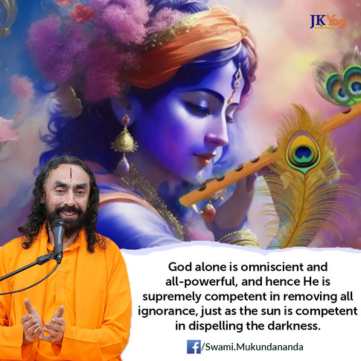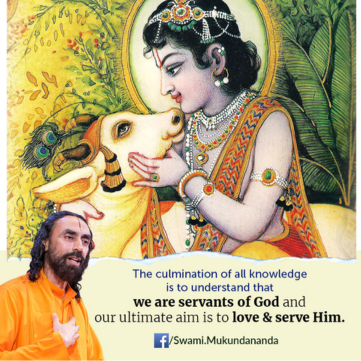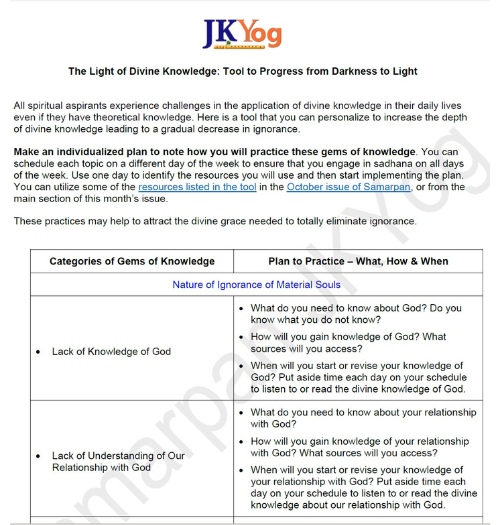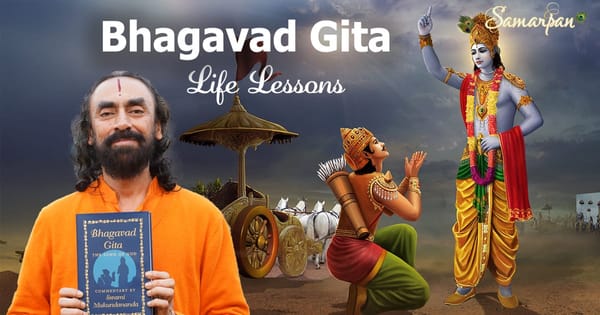
From the Editor’s Desk
Most religions metaphorically infer the light of divine knowledge to be that which is beyond the material intellect. It involves an inner transformation from the darkness of ignorance that has enveloped the soul since endless lifetimes, to the light of divine knowledge. During this month of Diwali, let us contemplate how we can kindle the light of divine knowledge in our hearts and intellect by gradually eliminating the darkness of ignorance.
Taking shelter and drawing inspiration from the Vedic knowledge (i.e., tatvagyan) and teachings of our Guru, Swami Mukundananda, this month’s Samarpan focuses on yet another small piece of the vast knowledge with practical tools for application.

Vedic Wisdom & Application
Theme of the Month
The Light of Divine Knowledge
Reflection Questions
- What does the Light of Divine Knowledge Mean?
- What is the Nature of Ignorance of Material Souls?
- How can We Get Rid of Ignorance?
What does the Light of Divine Knowledge Mean?
The Light of Divine Knowledge generally refers to that understanding which transcends materially conditioned human perception and is drawn from divine sources (e.g., religious scriptures and/or words of God-realized saints). The expression also infers access to deeper and higher forms of knowledge through spiritual experiences that internally reveal wisdom due to a connection with a higher power.

Spiritual aspirants depend on divine knowledge to find meaning in life, live a purposeful existence, and know the absolute truth that will help them connect with God through mentorship and coaching. While many different religions are practiced worldwide, the concept of the Light of Divine Knowledge has similar connotations. For example, in some Christian traditions, it is believed that the study of scriptures, prayers, and a personal relationship with God enables one to gain understanding and wisdom through religious experiences. A somewhat similar notion exists in some Islamic traditions where it is believed that Allah directly graces followers with the light of divine knowledge which is mystical and in the form of spiritual insights.
A slightly different perspective is reflected in Buddhism where the light of divine knowledge is experienced from attaining Nirvana or enlightenment through the dedicated practice of intense meditation, conscious awareness of the nature of the self, and understanding of the four noble truths. In Hinduism, divine knowledge of the Vedic scriptures and related spiritual practices under the guidance of a true Guru are considered to be the basis for attaining God-realization.
In essence, most religions metaphorically infer the light of divine knowledge to be that which is beyond the material intellect. It involves an inner transformation from the darkness of ignorance that has enveloped the soul since endless lifetimes.
What is the Nature of Ignorance of Material Souls?
Shree Krishna beautifully explains to Arjun that ignorance is not realizing the true nature of the soul and making worldly pleasures the purpose of life. Such desires harm the soul but ignorant souls consider them to be an indicator of success (i.e., a reflection of darkness but they wrongly perceive it as light). They perceive deprivation from sensual pleasure as darkness, whereas the truth is its opposite (i.e., a symbol of light). In this verse, Swamiji beautifully explains that “what is night for the sage is day for the worldly-minded people, and vice versa.”
या निशा सर्वभूतानां तस्यां जागर्ति संयमी |
यस्यां जाग्रति भूतानि सा निशा पश्यतो मुने: || 69||
ya nisha sarva-bhutanam tasyam jagarti sanyami
yasyam jagrati bhutani sa nisha pashyato muneh
What all beings consider as day is the night of ignorance for the wise, and what all creatures see as night is the day for the introspective sage. (BG 2.69)
The nature of ignorance described in the Bhagavad Gita and other Vedic scriptures refers to a fundamental lack of understanding or awareness of certain truths. While there are infinite things that materially conditioned beings are ignorant about, a few are presented here based on concepts that are consistently explained in Swamiji’s lectures.
- Lack of Knowledge of God. While God can be known only by those who have been graced with His Divine Knowledge and Divine Love, spiritual aspirants do have access to the sources that know God – the holy scriptures and God-realized saints.
The Devi Bhagwat Puran explains that God or Bhagavan is the possessor of ‘Bhag’ or infinite opulence characterized by infinite knowledge, wealth, beauty, fame, strength, and vairagya or detachment. The 1st sutra of the Vedanta-Darshan instructs seekers to acquire the knowledge of God – the Absolute Truth or Brahman. The 2nd sutra reveals that God is He, who created this world. God manifests and destroys the world and can take on as many forms as He wishes, including a formless aspect.
In spite of His infinite opulence, God is also the source of infinite divine qualities and attributes like compassion, love, inspiration, grace, justice, etc. He is waiting for us – His children, with open arms to embrace, provided we surrender to Him or to His saints. Our lack of knowledge of God is an obstacle to establishing a loving relationship with Him.
- Lack of Understanding of Our Relationship with God. All living beings are tiny fragments of the divine energy of the all-powerful God. We are constitutionally programmed to gravitate toward Him – the source of divine bliss. Lack of understanding that true bliss lies in Him, we search for it in the external environment.
Additionally, our material intellect is overpowered by the notion of God’s opulence, leading to our inability to establish a loving relationship with Him. In fact, most spiritual aspirants do not know that they can have a personal relationship with God in any of the bhavs or sentiments of love and devotion (see the January 2023 issue of Samarpan on The Bhavs of Devotional Practice). While we may possess this knowledge, thanks to mentorship from a true Guru, we must practice it correctly. Our material consciousness is geared toward seeking devotional bliss for our own pleasure rather than the pleasure of God/Guru.
- False Identification with the Material Body. Being vimukh from God (i.e., turned backward), we do not know our true identity as the divine soul. We identify with the physical body and the material mind and intellect. We know in theory that the soul is eternal and divine but we have no internal realization of this truth. This ignorance leads to a lack of realization of the true purpose of our existence, which is to serve God and Guru for their happiness.
We also do not fully realize the value of this human form, which is rare in and of itself. This human form is our only means to attain God-realization, but false identification with the physical body makes us search for happiness in the wrong direction when it lies in devotion, love, and service to God/Guru.
- Believing the Temporary World to be Permanent. Cognitively we understand that there is no guarantee for our life, nor for whatever we possess that makes us happy. We keep on accumulating things for the transient pleasure of our material body and senses. We focus on building a safety net of resources for our own security. In spite of living in areas prone to natural or man-made disasters, our hunger for accessing objects of comfort and prestige does not satiate. We also forget that one of the conditions of intellectual surrender is to believe that everything we possess belongs to God and to attract His grace, we must let go of the pride of ownership.
Thus, we falsely attach our minds to temporary objects and people, including our own bodies, knowing full well that everything including this body will be left behind when the soul departs. Saint Tulsidas said (on behalf of material souls), “If I had any attachment for Shree Ram, I would not have found the pleasures of the material world so appealing to my senses.”
-
Lack of Knowledge on Ways to Become Sanmukh (i.e., Turn Toward God). All the sources of ignorance described above exist because we do not know the means to turn toward God – the Light of Divine Knowledge and Divine Love. We are unable to completely detach from the material world and attach our minds to God to the point that attracts divine grace. Our minuscule knowledge of God results in shallow faith in Him, which in turn leads to superficial devotion and love to God.
Many seekers practice religious rituals with their bodies but their minds are bound to aspects of the material world. Many aspire for Mukti (i.e., liberation) instead of Bhakti (i.e., devotion) with the desire to escape from worldly miseries, but it should be the other way around. Lack of conscious awareness of the consequences of karma, people engage in actions that perpetuate suffering. Most of all, people search for happiness in the wrong direction and get despondently trapped in the unending cycle of life and death.

All of these factors adversely affect our ability to surrender to God/Guru. Thus, our ignorance continues. By acquiring and implementing the true knowledge of the scriptures taught by saints, individuals can gradually overcome ignorance and move toward the light of knowledge or spiritual awakening.
How can We Get Rid of Ignorance?
Even in the material world, the only way to dispel ignorance is to gain knowledge in the needed area. Material knowledge can be obtained via self-study for simple things, but for complex disciplines formal education and training are essential. Such knowledge is gained mostly through the ascending process where existing principles are subject to experimentation and further exploration. Thus, material knowledge is ever-evolving.
In contrast, Vedic or divine knowledge is apaurushiya or not created by humans. It is the eternal knowledge of God and not subject to experimentation. Therefore, it needs to be accurately interpreted. Divine knowledge is best transmitted through the descending process – from the Guru to the disciples, which makes it imperative to have a Guru to guide us from the darkness of ignorance to the light of divine knowledge.
-
Association with a True Guru. An association with a true Guru is one of the most sacred, blessed, unique, and beautiful of all relationships. It is characterized by unconditional love, compassion, and protection on the part of a Guru, and trust, faith, and devotion on the part of a disciple. Faith is a very critical ingredient for associating and benefiting from a Guru’s guidance. The deep faith needs to be based on the knowledge of Guru-tattva, not just attraction to His magnetic personality traits. The Guru teaches disciples the divine knowledge of God and enables them to gradually get rid of ignorance. To learn more about how to associate with a Guru, see the July 2022 issue of Samarpan.
- Practice Daily Sadhana. Absorbing the true knowledge of the Vedas is facilitated through various practices to get aspirants started on the path of spirituality including:
-
Listening to audio lectures (e.g., Swamiji’s Official YouTube channel and JKYog Bhakti Lectures on YouTube) or reading the scriptures (e.g., Bhagavad Gita – The Song of God) recommended by the Guru. If we read or hear knowledge from sources not recommended but the Guru, our material intellect may misinterpret the divine knowledge and we may become more confused instead of gaining clarity.
-
Chanting the divine names of God and Guru with the mind attached to Them. This practice becomes easier by chanting bhajans or kirtans written by Jagadguru Shree Kripalu ji Maharaj, specifically to enable us to develop divine sentiments that help to purify the heart. (See examples for different sentiments in The Power of Kirtans, March 2023 issue of Samarpan.)

-
Praying with humility by acknowledging our insignificance in this universe. All bhakti saints have repeatedly taught us to strive for humility by contemplating the infinite shaktis of God, the shaktis bestowed upon the true Guru, and feeling grateful for the human form as the only opportunity to serve God/Guru. (Detailed processes available in Practicing Humility, August 2021 issue of Samarpan).
-
Meditating (specifically Roop-Dhyan) on His exquisite forms, leelas, abodes, virtues, and saints. There is no better way to attach the mind to the divine realm than Roop-Dhyan meditation. There are many guided meditations conducted by Swamiji to enable us to attach the mind to God/Guru.
-
Engaging in deep contemplation on learned knowledge. Contemplation helps us to transform this knowledge into resolute beliefs (i.e., nididhyasan). It is a mental practice that involves deep reflective thought about one’s true identity, the purpose of life, the individual soul’s relationship with God, and the practice of spirituality. (Read the November 2022 issue of Samarpan on this topic.)
-
Implementing the knowledge to develop mastery. Swamiji has repeatedly emphasized that true knowledge is of no use unless it is consistently implemented. What kind of knowledge needs daily practice? The things noted above on how to get rid of ignorance and those noted below on how to practice deep devotion.
These tools deepen one's connection with the divine and help to get rid of ignorance.
-
- Practice Deep Devotion. The next step in getting rid of ignorance is to judiciously practice deep devotion through repeated contemplation on the three conditions of sadhana bhakti described in The Power of Thoughts (pp. 210-214).
-
Ananya Bhakti (i.e., Exclusive Devotion). It means to attach the mind exclusively to God/Guru or anywhere in the divine realm without exception. We must relinquish all kinds of worldly desires as well as of liberation. This is possible only if we believe in the wisdom that God alone is our true relative and that all other relationships are temporary (see Bhagavad Gita 8.14).
-
Nitya or Nirantar Bhakti (i.e., Constant Devotion). It means to engage in devotion and practice the presence of God at all times. This would be possible only if we perceive His presence and believe Him to be our witness and protector at all times when doing anything whether worldly or devotional (i.e., Karm Yog or the science of work).
-
Nishkam Bhakti (i.e., Selfless Devotion). It means to practice selfless devotion and love with no desire or expectation to receive anything in return from God/Guru. We should certainly not ask God for material things but also not ask for liberation (i.e., mukti). The love should be unconditional and expressed through seva primarily for His happiness.
-
-
Participating in Satsang (i.e., spiritual congregation). Bhakti saints stress the importance of surrounding oneself with spiritually minded individuals through Satsang. Satsang is not just a collection of physical bodies going through a spiritual drill. It is the collective effort to free the mind from worldly distractions and focus the intellect on the divine realm.
-
Surrender to God/Guru (i.e., sharanagati or samarpan). Surrender is a state of consciousness where the body, mind, intellect, and senses of knowledge and perception are submitted to God. It is founded on deep faith and belief that God and Guru alone have our best interest at heart and will guide us toward the goal in a way that they deem to be the best. There is no desire to rely upon one’s own knowledge, wealth, social status, strength, and ability to navigate difficulties in life.

Such awakenings enable souls to progress toward the light of divine knowledge and may help to attract the divine grace needed to totally eliminate ignorance.

Tools for Your Personal Growth
All spiritual aspirants experience challenges in the application of divine knowledge in their daily lives even if they have theoretical knowledge. Here is a tool that you can personalize to increase the depth of divine knowledge leading to a gradual decrease in ignorance.
You can make an individualized plan to note how you will practice these gems of knowledge. You can schedule each topic on a different day of the week to ensure that you engage in sadhana on all days of the week. Use one day to identify the resources you will use and then start implementing the plan. You can utilize some of the resources listed in the tool in the October 2023 issue of Samarpan or from the main section of this month’s issue. These practices may help to attract the divine grace needed to totally eliminate ignorance.
A downloadable tracking sheet is available for you to use.

Use this tool to personalize your plan to increase the depth of divine knowledge leading to a gradual decrease in ignorance.

Love to Hear from You
- How did you apply the Vedic Wisdom?
- What challenges did you experience in the process?
Please share your comments under “Join the Discussion” below.

Gems of Wisdom from Swamiji
Here are a few YouTube video titles with related links and published books where Swamiji has described the nature of ignorance of the material mind and ways to gain divine knowledge.
- 9 Signs Your Mind is Getting Cleansed
- What Actually is God – An Eye-Opening Speech
- Feeling the Presence of God with You
- No One Explained Loving God This Way
- Mukundananda, S. (2022). The Power of Thoughts, Penguin Random House: Gurugram, India.
- Mukundananda, S. (2022). Bhagavad Gita – The Song of God, Westland Publications: Chennai, India.
- Mukundananda, S. (2021). 7 Divine Laws to Awaken Your Best Self, HarperCollins Publishers: Noida, India.



Hold Your Breath! Check out Upcoming Events
We are very excited to share a dynamite event this month!

JKYog Diwali Mahotsav with Swamiji
Diwali is always a very special occasion for all Hindus. The significance of the Festival of Lights increases manifold when devotees get to celebrate it in Swamiji’s divine presence. A beautifully lit Temple looks like Golok on earth when Swamiji is present at the Radha Krishna Temple of Dallas – the official Headquarters of JKYog.
The grand Diwali celebration will be held from November 9 to 13, 2023. There are numerous devotional and fun activities throughout the 5-day program including poojas, Satsang, kirtans, and a food festival! Mark your calendar to not miss these special events:
- Lakshmi Pooja to invoke the blessings of the Divine mother
- Govardhan Pooja to commemorate how Lord Krishna protected his devotees
- 1008 recitations of the Hanuman Chalisa
- A very special Diwali Satsang with Swamiji filled with the bliss of divine leelas
- Soulful kirtans to invoke the blessing of God and Guru
- Many more activities through the 5-day program
Venue: 1450 N Watters Rd, Allen, TX 75013
Details & Seva Opportunities: https://www.radhakrishnatemple.net/Diwali
Here are some memorable moments from last year’s Diwali Mahotsav.

Voices from the Global Community
JKYog’s e-Journal Samarpan inspires the community by introducing members to devotees who have been impacted by the scriptural knowledge taught and disseminated by Swamiji. This month, two devotees, Pritha Rao and Himanshu Saraswat, describe how Swamiji’s teachings enabled them to gain the divine knowledge that is transforming them from within.


We invite you to share your inspirations and success stories with us at secretary@jkyog.org.

JKYog Transforming Communities
Here, we typically share the amazing activities and news about programs conducted by various JKYog centers in the U.S.
Transformation in communities occurs in many ways including the inspiration and upliftment through the words or Vaani of saints. This month we share beautiful glimpses of Swamiji’s Address at the Grand Celebration of Sanatan Dharma at the Akshardham Mahotsav, Robbinsville, New Jersey.
Swami Mukundananda's Inspiring Message
Swami Mukundananda represented JKYog at the Celebration of Sanatan Dharma on September 30, 2023, at the BAPS Swaminarayan Akshardham in Robbinsville, NJ. This celebration brought together representatives from 400 Hindu faiths and organizations. There were a small number of spiritual luminaries and invited speakers from BAPS, JKYog, and other organizations at the Celebration of Sanatan Dharma.
Swamiji was honored as one of the Guests of Honor and an invited speaker. His presence at the celebration was considered a mark of honor and added a significant spiritual dimension to the event.
Swamiji's address was filled with inspiration and enthusiasm. He commenced His speech by offering heartfelt pranam or salutations to Bhagwan Swaminarayan and paid heartfelt homage to the devotion and sacrifice of the tens of thousands of Swaminarayan devotees who contributed to the construction of Akshardham and made it a reality. Swamiji expressed his deep reverence for the unwavering faith of Swaminarayan devotees and their devotion to their Guru.
Swamiji emphasized that Akshardham was not just a magnificent structure but a manifestation of the triumph of Sanatan Dharma itself. He delivered an electrifying speech that highlighted the importance of unity within diversity and diversity within unity – a special gift of the Hindu faith to the world. Here is your opportunity to hear Swamiji’s speech on this momentous occasion.
No words can truly capture the essence of Swamiji's highly inspirational speech. The depth of his message, citation of profound quotes from Vedic scriptures, positive and uplifting energy, and underlying humility made this the most impactful speech. Swamiji’s words resonated with the essence of unity and victory embedded in Sanatan Dharma. The overwhelming applause and appreciation from the audience were a testament to the power of Swamiji’s inspirational talk.
Swamiji also had the opportunity to meet with saints of BAPS, including His Holiness Mahant Swami Maharaj, the spiritual leader of BAPS, and Mahamahopadhyya Pujya Bhadreshdas Swami. The details of this and other events can be found in a related blog.

Glimpses of Past Events
Want a glimpse of some of our events? This month we share some beautiful glimpses of the Grand Diwali Mela 2023.








